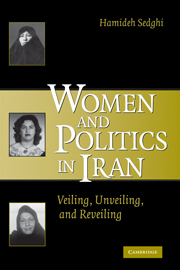Book contents
- Frontmatter
- Contents
- Acknowledgments
- Transliteration and References
- Introduction
- PART I WOMEN IN EARLY TWENTIETH-CENTURY IRAN
- PART II WOMEN IN THE KINGDOM OF THE PEACOCK THRONE
- 2 The Pahlavi Dynasty as a Centralizing Patriarchy
- 3 Economic Development and the Gender Division of Labor
- 4 The State and Gender: Repression, Reform, and Family Legislation
- 5 Women and the State
- PART III WOMEN IN THE ISLAMIC REPUBLIC OF IRAN
- Conclusion
- Glossary
- Selected Bibliography
- Index
5 - Women and the State
from PART II - WOMEN IN THE KINGDOM OF THE PEACOCK THRONE
Published online by Cambridge University Press: 22 August 2009
- Frontmatter
- Contents
- Acknowledgments
- Transliteration and References
- Introduction
- PART I WOMEN IN EARLY TWENTIETH-CENTURY IRAN
- PART II WOMEN IN THE KINGDOM OF THE PEACOCK THRONE
- 2 The Pahlavi Dynasty as a Centralizing Patriarchy
- 3 Economic Development and the Gender Division of Labor
- 4 The State and Gender: Repression, Reform, and Family Legislation
- 5 Women and the State
- PART III WOMEN IN THE ISLAMIC REPUBLIC OF IRAN
- Conclusion
- Glossary
- Selected Bibliography
- Index
Summary
Ashraf Dehghani, the only woman in the Central Committee of the underground opposition, the Organization of Iranian People's Feda'i Guerrillas (OIPFG), was twenty-two years old in 1971, when she was arrested. Her memoirs recall her prison experience: “The thugs strapped me to a bed. … whipping the soles of my feet. … they gave me electric shocks using [a] truncheon-shaped electrode,” then they “strapped me to a bench, face down. The shameless vermin dropped his trousers and assaulted me… .” Resisting SAVAK and the state's vicious rapists and interrogators, Dehghani's defense was to maintain silence. Having so provoked and diminished her abusers, she was transferred to Tehran's infamous Evin Prison, where still more cruel “professional” torturers attempted to force a confession. There, she remembered, “they picked up a pair of tongs, gripping and twisting my flesh” and “they began compressing my fingers in a vice. They said they were going to pull out my nails… .” But she persisted in her resistance while wishing her own death under the state's torture. Iranian scholars and feminists alike have largely ignored Dehghani's tale. She had a unique life and experiences: she was a non-conformist, militant, and defiant political actor.
In contrast, many other politically active women made their accommodations with the state, representing its class and political interests. One such woman was Mahnaz Afkhami, the Secretary General of the Women's Organization of Iran or WOI (1970–79) and Minister of State for Women's Affairs (1970–78).
- Type
- Chapter
- Information
- Women and Politics in IranVeiling, Unveiling, and Reveiling, pp. 152 - 196Publisher: Cambridge University PressPrint publication year: 2007



